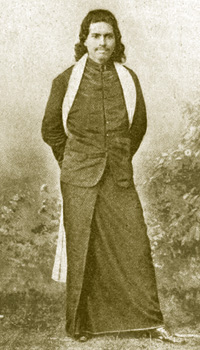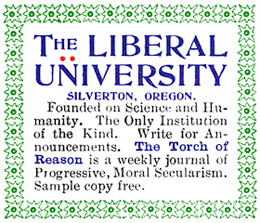By Ratna Senanayaka — July, 1901
 However our modern Christian friends may claim their religion as being a direct revelation from God, it is nevertheless obvious that the pioneer Christians (Moses and the Hebrews), in laying the foundations of their social systems and political institutions, did not escape that ancient Hindu influence which pervaded Persia, Egypt and other Asiatic countries.
However our modern Christian friends may claim their religion as being a direct revelation from God, it is nevertheless obvious that the pioneer Christians (Moses and the Hebrews), in laying the foundations of their social systems and political institutions, did not escape that ancient Hindu influence which pervaded Persia, Egypt and other Asiatic countries.
If the laws, customs and institutions of Judea so strongly recall those of India as to suggest Hindu colonization, how could it have escaped likewise a religious influence?
The fact must be kept in mind that the Hebrews were born and bred in Egypt, the first country (through Indian colonization) to be affected by that antique civilization which has radiated even to Europe.
That Egypt was so colonized is proven, not alone by the strong resemblance to India of its government, arts and religion, as preserved by the immigrants upon the new soil, but also by its ancient name of Sanskrit origin, “Aguphta,” signifying “the country of the Nile.”
These being facts acknowledged by researchers, we will without further explanation endeavor to demonstrate the Hindu influence on the Bible either directly or indirectly through the Egyptians.
According to the testimony of Moses, himself a Hebrew, his race, while slaves to the Egyptians, had multiplied to such an extent as to form a nation within a nation, seriously alarming the Egyptian King Pharaoh, who, after failing in every effort to lessen their rapidly increasing numbers, ordered the destruction of every male infant at birth.
One poor mother in desperation enclosed her child in a willow basket and consigned it to the mercy of fate by concealing it among the rushes of the river Nile. That fate was kind enough to smile, we all know, through familiarity with the story of Moses, his discovery and adoption by Pharaoh’s daughter.
Having been reared as a royal child at the court of kings and therefore familiar with their customs until forty years of age, he undoubtedly shared the privilege of all high-born Hindus and Egyptians, of being initiated in the temple, into the religious principles and laws of the country. This explains whence came the enlightenment, enabling him to establish theocratical and priestly societies so similar to those of India and Egypt, and of which Christianity is the outcome.
While still an inmate of the royal household, he learned of his Hebrew descent; the knowledge of the oppression of his race as slaves to the Egyptians aroused within him feelings of kinship and sympathy, resulting in his resolve to accomplish their deliverance.
He led them through the desert into the wilderness, where they sojourned for forty years. Owing to their previous state of bondage, covering a period of over four hundred years, they naturally were without knowledge or education, either inherited or acquired; and Moses realized the necessity of administering laws to this undisciplined horde, in order to perfect the organization of a civilized nation-to be. Accordingly was written in the wilderness, his laws, on tables of stone; later, a portion of the accepted Christian Bible, which was in truth but a modified reproduction of the Hindu Sacred Writings, as studied by him under the direction of Egyptian priests.
He revises the Hindu legends of God and the creation, but prescribed the same laws, sacrifices and ceremonies; divided the people into castes; and adopted the same penal system.
Belief in one God
Hindus, like Christians, recognize but one God, as defined in the Mahabharata—”God is one, without form or parts; Infinite, Omnipresent and Omnipotent. He made the heavens and world to spring forth from infinite space. He is the Divine mover, the great originating essence, the efficient and material cause of all.”
The seeming polytheism of Hinduism is because of the worship as deities, of the many manifestations of the one Supreme Being.
The Vedic poet declares:
“The Ganges that flows—it is God.
The Ocean that rose—it is God.
The Wind that blows—it is He.
The cloud that thunders,
The lightning that flashes,
It is He who is All in All,
Because all is in him.”
Christians claim belief in but one God, yet we find in Genesis of the Bible, the attributes of, or reference to, more than one—as:
“Let us make man in our image, after our likeness.” “The serpent said to the woman, ye shall be as gods, knowing good and evil.”
“And the Lord God said, behold the man is become one of us, to know good and evil.”
* * * * * * * *
The Vedic doctrine, although a deep philosophy, combining the theories of creation and evolution, appeals more directly to the logical mind than the more allegorical one of the Bible.
Moses was too sagacious to present these teachings in their profound and philosophical aspect to this slave race, with its limited powers of comprehension; hence the necessity of simplifying and presenting them in allegorical form, in a manner commensurate with the degree of intelligence possessed by the people.
We will not explain at length the principles of the Vedic philosophy, but by comparing a few quotations from it with those of the Bible, show the evidence of the latter’s teachings being founded upon those of the Vedas.
According to Veda, matter is subject to the same natural law of change regarding existence and decomposition as is vegetable life. The period of life and activity is followed by one of death and rest. Everything that has an origin decays.
The period of Prayala, or “Night of Brahma,” was the utter dissolution of all that existed, and corresponds to 4,327,000 years of human reckoning, during which time the germ of all things regenerating itself into the bosom of Brahma, became as a great light diffusing itself over all and dispersing the darkness. As the celestial spirit became thus manifest in the strength and power of all its majesty, chaos was transformed into a fruitful womb, prepared to bring forth the universe.
Then Narayana, the divine spirit, moved upon the waters, and by his supreme omnipotence, the earth and everything there was gradually brought into existence.
Narayana (from Nara-divine spirit, and Yana-he who moves upon the water) was later called Brahma, and recognized as the Supreme Being, the creator, God the Father. This strikingly corresponds to the Bible account of the creation. “The earth was unformed and void, and darkness was upon the face of the deep, and the spirit of God moved upon the face of the waters.”
The Vedas further describes the earth as prepared for its inhabitants, as carpeted with living green; furnished with shrubs and trees bending under a weight of fruit for their refreshment; ornamented with fragrant and brilliant-hued flowers-God’s pictures; canopied with star-spangled fathomless blue; and the whole and made harmonious and attractive by melodious song-birds and sportive animals.
Brahma being gratified with the sublime work of his creation, he perceived that the time was come to fashion a species of a higher order.
Two beings, male and female, were the result of the first germs of human life. These he endowed with the power of reproduction-like animal and plant life. but having greater superiority by being invested with the “Ahamkara”—consciousness, and the power of speech. They were inferior only to God and the angels.
The man was distinguished by form, strength and majesty, and named “Adima,” meaning the first man. The woman received grace, gentleness and beauty and was called” Heva,” which signifies-what completes life.
God thus proclaimed the equality of man and woman in heaven and on earth, and gave them for an inheritance, the “Lanka”—the beauteous island of Ceylon, commanding them or their descendants never to leave it.
“Go,” said he to Adima, “unite and produce beings which shall be your living image upon earth for ages and ages after you shall have returned to me. I the Lord of all that exists have created you to worship me throughout your life, and those who shall have faith in me shall share my happiness, after the end of all things.”
Adima and Heva lived many years in perfect happiness, with neither suffering nor disturbing cares; but as even the smoothness of perfect happiness will sometimes grow monotonous, so Adima was at length besieged by disturbing desires, by the evil spirit, in the form of Rakshya.
“Let us wander through the island,” said he to his wife Heva, “and see if we may not find some place even more beautiful than this.” So together they wandered for days and days, finally arriving at the southernmost extremity of the island, whence they gazed longingly across the sea at the land, so attractive and alluring by reason of its distance, that the vision was to them one of enchantment.
“Behold what a beautiful country,” exclaimed Adima, “and what fine fruit such trees must produce. Let us go and taste them, and if that country is better than this we will dwell there.”
But Heva besought him to do nothing to irritate the Lord. “Have we not pure water and delicious fruits here,” said she. “Why should we seek other things?” “True,” replied Adima, “but we shall come back.
What harm can it be to have visited this unknown country that presents itself to our view?” Finally Heva agreed. Then Adima, placing her upon his shoulder, crossed the sea through a narrow, shallow, rocky channel, which connected the isles with the mainland. This place is still known as “Palam Adima”-Adam’s Bridge.
No sooner had they touched the other shore than trees, flowers, birds and all that had attracted them from the opposite shore, vanished. It had been but an illusion raised by Rakshya, the evil one, to tempt them to disobedience.
They quickly turned to retrace their steps, but behold, the rocky bridge also had disappeared. It was destroyed by the divine displeasure. In terror they threw themselves upon the bare ground and wept.
The voice of the Lord came from the clouds saying, “Adirna, why hast thou disobeyed me, and broken my commandment which I gave thee, never to leave the island?”
The author of all things was about to curse them, when Adima humbly besought him, saying, “Lord, curse me, for it was my fault, not hers.”
Heva cried out, “Lord, if thou curse the man, curse me, too, for I would rather die with him than to live without him, for he is the most near and dear unto my heart.”
The second time came the voice from the clouds, saying:
“Woman, thou hast only sinned from love to thy husband, whom I commanded thee to love, and thou hast hoped in me. I pardon thee and him for thy sake; but ye may no more return to the abode of delight which I created for your happiness, through your disobedience to my commands. The spirit of evil has obtained possession of the earth. Your children shall be reduced to labor, and made to suffer by your fault; they will become corrupt and forget me.”
Thus the fall of man from the grace of his maker is stated in the Ramatsariar text and the commentaries of the Vedas (the Hindu Scriptures).
According to the Bible, God having created the heavens and earth, sun, moon, stars, fire, water, air, and all life of the lower order, “behold he found there was no man to till the ground.” He said, “Let us make a man according to our own image, after our likeness.”
So God created two persons, male and female. The man he named Adam,” and Adam called the woman “Eve.”
God made them superior over all his creation, and inferior only to himself and to the angels. He established them in a garden called Eden, filled with blooming flowers and fruited trees, with permission to eat from all save the fruit of one tree-the tree of knowledge of good and evil.
“The day,” said he, “ye shall eat thereof, ye shall surely die.” ‘Which, interpreted, means, dying a spiritual death, or separating from God or Good; and being corrupted morally, by seeking bodily satisfaction here and there.
No sooner had Adam and Eve become happily settled in their earthly paradise than the evil one, envying their content, appeared to Eve in the guise of a serpent, tempting her by means of the forbidden fruit, to disobedience.
She ate of it, and persuaded her husband to do the same. The Lord appeared and fulfilled his threat of punishment. The earth was corrupted, sorrows multiplied, and they were obliged to earn their living by hard labor.
After the fall of Adam and Eve, they went out east of the garden and there dwelt, producing many beings.
The reader will see that the biblical account of the creation and the fall of man, is merely a slightly altered reproduction of the older chronicle.
All other biblical legends, such as the flood and Noah’s ark; Abraham’s intended human sacrifice (the very name “Abraham” suggests the Brahamis of India); Job’s patience during affliction; the wisdom of Solomon; Jonah and the whale; as well as the ceremonies of sin and peace offerings, and the civil and criminal laws prescribed by Moses, are to be found in the Vedas.
The legendary resemblance between the Vedas and the Bible could be made more convincing by quotations in full from each source, could space permit. We will confine ourselves, however, to quoting parallel cases of civil and criminal laws only, of the Hindus and Hebrews.
Matrimony
The accomplishment of the marriage ceremony, by giving away of the woman by the father; the husband’s acceptance of her; the written bans by the priest; the religious rites; music and feasting, were all recognized as Roman rites when adopted by the Christian nations who still continue to follow them, ignorant of the fact that they originated from Hindu ordinances, which was the first law to proclaim that unity of marriage was an indissoluble bond, and whose theology declares, “Even death cannot separate the faithful husband and wife.”
Hindu law permitted but one wife, which fact was evidently overlooked by ancient Hebrews, who possessed a plurality of wives.
Marriage of Hindu and Hebrew Widows
According to the ancient Hindu belief, a father can only attain to the eternal bliss through the atoning sacrifices and funeral ceremonies performed by his son on his tomb, and renewed on each anniversary of his death.
These annual sacrifices removed the last stains which otherwise would prevent the soul from reuniting with its creator—the highest form of felicity provided for the just. It is, therefore, of most importance that every man should have a son who may open the gates of the immortal abode of the supreme Brahma.
For this reason, the Hindu religion appeals to the compassion of brother or kinsman, and aids him in sacrificing his own feelings to a sense of fraternal duty by marrying his brother’s wife.
With the Hindu, only the first son thus born belongs to the dead husband, becomes his heir, and is bound to conduct the funeral rites each year; all other children are recognized as the progeny of the rightful parent, whose sense of duty does not therefore interfere with his own hopes of a son to perform like ceremonies for him.
Should no second son be born to him, the law provides, by permitting his adoption of one, to bear his name, and to perform the post-mortem sacrifices for his soul’s welfare.
Now for the Hebrew custom:
We read in the Bible (38th chapter Genesis) the following: “Judah took a wife for Er his first born, whose name was Tamar. And Er, Judah’s first-born, was wicked in the sight of the Lord, and the Lord slew him. And Judah said unto Onan, his second son, Go in unto thy brother’s wife and marry her, and raise up seed unto thy brother.” Then Onan married his brother’s wife Tamar.
Again we read in Ruth:
“Boaz said, I took Ruth, the wife of Mahlen, to be my wife, to raise up the name of the dead upon his inheritance, that the name of the dead be not cut off from among his brethren and from the gate of his place.”
Many similar passages in the Bible show it to be a law among Hebrews, for the nearest relative of a man dying without a son, to marry the widow, the offspring being considered that of the deceased and sharing his inheritance.
But whence this custom or why so imposed by the Hebrew legislature, a thorough search of the Old Testament fails to disclose. It gives no light on the subject, no reason why the brother or relative should be under such obligation to the dead one, and in thus continuing the latter’s family blot out, as it were, his own identity.
The fact is, this custom originating in India, was introduced into Egypt by Hindu immigration, and copied by the Hebrews, who were ignorant of its real intent; and therefore is Judaism unable to give an explanation of this observance.
The Hebrew custom differs, inasmuch as that all of the succeeding sons belonged by law to the dead husband; which seems a rank injustice, as well as an absurdity—the continuance of one line of descendants at the expense and extinguishment of another line.
However irrational and illogical this Hebrew usage may appear, it is nevertheless obvious to the thoughtful mind that this also was but a preserved Hindu custom, whose legitimate object was forgotten, in fact, it was the shadow without the substance.
Defilement from Contact with the Dead
From the Vedas:
“Impurity from touching of the dead continues ten days. Who enters the house of the dead is unclean for ten days. When a man dies, all the vessels in the house are impure. Vessels of metal are purified by fire. Vessels of earth are broken and buried. Man is cleansed by ablutions with the waters of purification.”
From the Bible, Numbers:
“Whosoever shall touch the body of a dead man is unclean for seven days, and must be cleansed by aspersion of the waters of expiation … All who enter the tent of the dead and all the vessels therein are unclean for seven days. The defiled defiles all that he touches.” Forbidden by the Manu (Hindu legislature).
Animals Unclean for Food
The regenerated man shall abstain from all animals that divide not the hoof, except those permitted by the scripture. The domestic pig is declared impure, although dividing the hoof.
All birds of prey, such as the vulture, the eagle, the kite; and all that strike with the beak and tear with the claws, are prohibited; as are also the crane, the parrot, the swan, the woodpecker, and all that seize their prey with the tongue; all fish that have not fins and scales, and all creeping animals, or those that dig holes with their claws, are forbidden as most impure of all.”
Forbidden by the Bible:
As Moses names no animals unfit for food other than those mentioned above, it shows this to be another instance of a borrowed custom.
The Eating of Dead Animals
According to the Ramahsariar, “The man who eats the blood of an animal permitted as food by the Vedas, is called the son of a vampire, and shall perish; for no man shall nourish himself with blood. Whosoever shall eat of the blood of an animal forbidden by the Vedas shall die of leprosy, and his soul shall revive in the body of an unclean jackal. “Blood is the life; it is the divine fluid that waters and fertilizes matter, of which the body is formed; just as the hundred arms of the Ganges waters and fecundates the sacred soil.
“As it would be senseless to attempt to dry up the source of the great river, so neither may the source of life be uselessly drained nor profaned as food.
“It is through the blood that the divine essence, emitted from the ‘Great All’ (who is all and in all) and which is the soul, unites itself with the body. It is the blood which unites the fetus to the mother. It is by the blood we hold to God.”
In the Bible, Moses likewise forbids the use of the blood of animals; and for the same reason-it represents the life.
Animals for Sacrifice to be Killed Before the Tabernacle
From the Sama Veda:
“Let him lead his animals before the temple, and the priest shall slaughter it in offering to the Lord; and he shall sprinkle the blood of the victim upon the altar; for the blood is the life, and the life in departing should return to God. “Who shall eat flesh without conforming to prescribed rules of the holy scripture, he shall die ignominiously, for he has shed blood without offering it to the master of all things.” Compare this with the Bible, where in Leviticus we read: “Every man of the house of Israel who shall have killed an ox or a sheep or a goat in the camp, instead of slaughtering them before the tabernacle as offerings to the Lord, shall be guilty, and shall perish in the midst of the people, as if he had shed the blood of one of his fellows.”
Precepts for the Priests
In the Vedas, for Brahmanas (Hindu priests): “Let the officiating Brahamin abstain alike from spirituous liquors and from the pleasures of love, before confronting the majesty of nature’s Lord, to offer him the sacrifice of expiation in the temple. The spirituous liquors beget drunkenness, and the neglect of duty, and they profane prayer. The divine precepts of the holy scriptures may not be uttered by a mouth poisoned by drunkenness. Drunkenness is the worst of all vices; for it obscures reason, which is a divine ray from Brahma’s self.
The pleasures of love permitted amongst men, and allowed to the devotee, are forbidden to the priests, when preparing themselves for contemplation of the great Governor of the universe.
“The Brahamin may not approach the altar of sacrifice, but with a soul pure, in a body undefiled.”
Bible, Leviticus:
“The Lord also said unto Aaron (Hebrew high priest), you shall not drink wine, you nor your children, nor anything that intoxicates, when entering the tabernacle of the testimony, lest ye be punished with death.”
“This precept is eternal and shall be followed by all generations who succeed you, that ye may have knowledge to discern what is holy and what is profane; what is pure and what is impure; and that ye may instruct the children in the laws, of which the Lord hath given them by the mouth of Moses.”
In conclusion, is it not well to recognize the truth (in view of the strong resemblance between the customs of Hindus and Hebrews), that the latter’s doctrines were based upon the former? Inasmuch as history proved that the great current of Hindu immigration was the means by which was established in Egypt all political, religious and social institutions as herein described, and which were anterior to the Hebrews.
Is it not, then, evident that Christianity, whose early structure was built upon the laws of Moses, is really of Hindu origin? Can there be any question of which did the borrowing?





